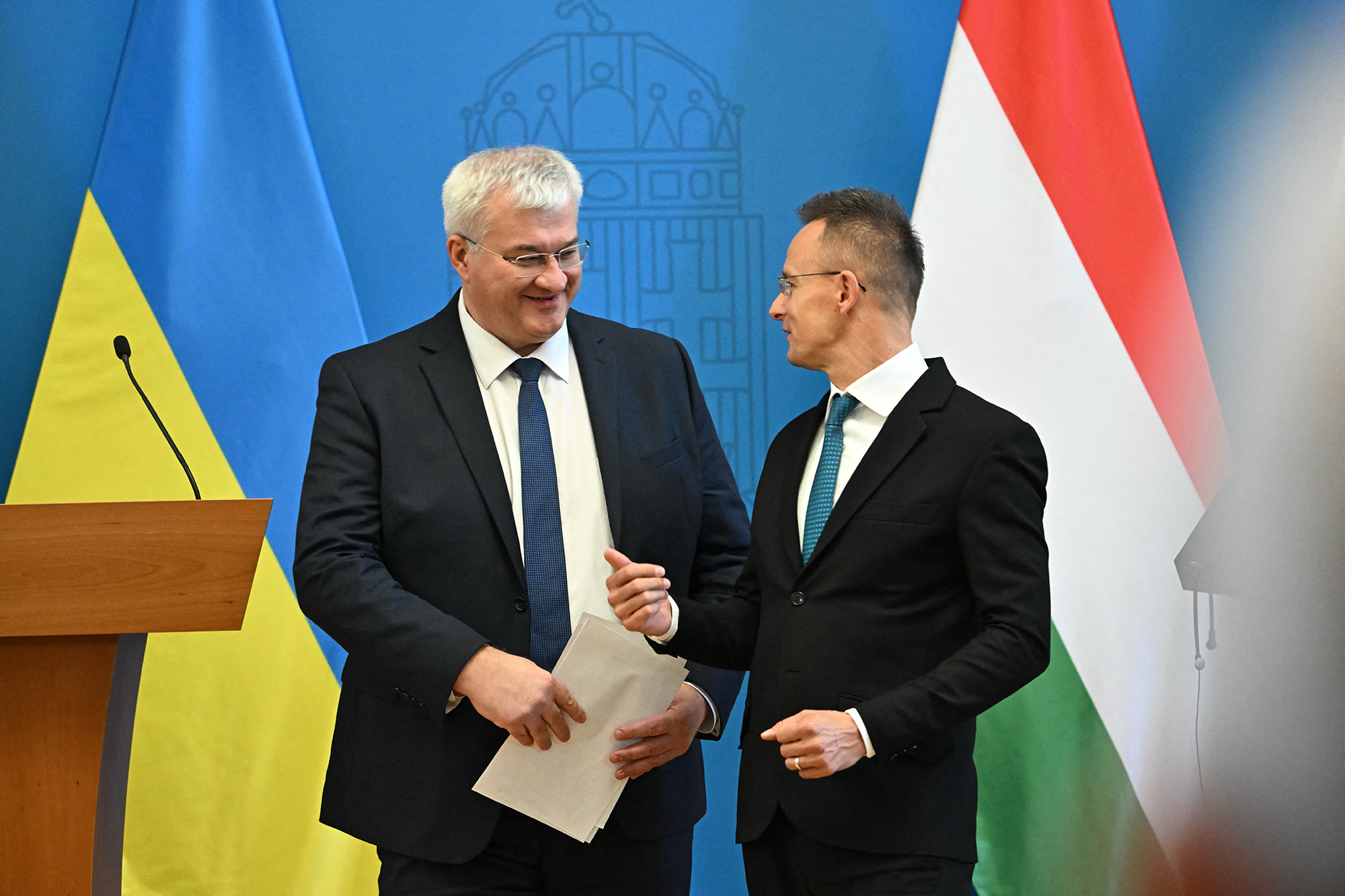"Calculated friendship." What lies ahead for Ukraine and Hungary's relationship, and who is Orbán afraid of?
Discover how Ukraine aims to address its problematic issues in relations with Hungary, how the powerful Viktor Orban unexpectedly gained a political rival, and what influence mechanisms exist between Kyiv and Budapest in this report by RBC-Ukraine journalist Roman Kot.
CONTENT:
"Ukraine is a non-existent country," "defeating Russia is impossible," "Ukraine has lost its sovereignty," "Washington does not want peace" – such statements would be expected from any representative of the Russian regime or propagandists. Yet these are the words of the leader of a country that is a full member of the European Union and NATO – Hungarian Prime Minister Viktor Orban.
His subordinates are not lagging behind either. For instance, recently, Hungary's Foreign Minister Peter Szijjarto claimed that Ukraine's NATO membership could allegedly lead to the start of World War III.
The words align with actions. Even before the full-scale invasion, Hungary regularly obstructed Ukraine's path to NATO membership. With the onset of the large-scale war, when the importance of European unity for Kyiv has increased manifold, Orban's actions create even more problems. Whether it concerns the approval of another sanctions package against the aggressor country, or the allocation of new aid to Ukraine, or subsequent steps for Ukraine's integration into the EU and NATO.
For example, due to Budapest's stance, 6.5 billion in aid to Ukraine from the European Peace Fund has been blocked for a year and a half.
However, despite this, recent developments have sparked hopes that relations between Ukraine and Hungary might become, if not warmer, at least more constructive.
Ukraine-Hungary: A Hint of Understanding
On September 30, Ukrainian Foreign Minister Andriy Sibiga met in Budapest with his Hungarian counterpart Peter Szijjarto. After the talks, both noted a "positive dynamic" in addressing the issue of the Hungarian minority in Transcarpathia – a nominally key problem in bilateral relations.
According to RBC-Ukraine, during the negotiations, Ukraine presented Hungary with its proposals for normalizing relations. These proposals pertain not only to the 11 points previously presented by Viktor Orban as an ultimatum. Recall that in June, Hungary put forward a series of demands related to language, education, political representation, and cultural rights of the Hungarian national minority in Transcarpathia in exchange for unblocking Ukraine's EU integration.
 Andriy Sibiga and Peter Szijjarto in Budapest (photo: Getty Images)
Andriy Sibiga and Peter Szijjarto in Budapest (photo: Getty Images)
Ukraine hopes to finally implement the idea that President Volodymyr Zelensky proposed back in 2020 – to sign a basic memorandum with Hungary on historical and language issues. However, the current discussions involve a much broader range of topics and are not in the format of a memorandum.
According to an informed source for RBC-Ukraine, Kyiv is currently looking to build pragmatic and expected relations with Hungary – similar to what has been achieved with the similarly complex Slovakia.
Andriy Sibiga, right after his appointment, wanted to make his first official trip to Budapest. This did not happen due to scheduling issues. Therefore, Sibiga first visited Romania and Slovakia. Nevertheless, Budapest being among the first capitals he visited is a significant political signal.
Preliminary sources for RBC-Ukraine express cautious optimism. At the same time, they understand that internal challenges are brewing in Hungary, which may eventually call into question Orban's hold on power and could shift his stance towards Ukraine, as has happened several times before.
Opposition Leader Madyar Challenges Orban
A formidable competitor has emerged for Orban in Hungary – Peter Madyar. As of mid-September, he is preferred by 39% of Hungarians who would participate in voting if elections were held now. Meanwhile, Viktor Orban has the support of 43% of respondents.
Importantly, Madyar's party – "Respect and Freedom" – is also gaining traction amid his rising popularity. The Hungarian name of the political force abbreviates to TISZA, which is also the name of the river flowing through Ukraine and Hungary. The rise in popularity of "TISZA" has come at the expense of other opposition parties, none of which currently surpass the electoral threshold, even though several opposition forces have small factions in the current parliament.
Madyar's party also secured second place in the European Parliament elections in June this year, garnering about 30% of the votes, while the politician himself became an MEP.
Until recently, Peter Madyar was outside of politics. He previously worked in governmental institutions and managed Hungary's relations with the European Parliament, and was also the husband of Hungary's Minister of Justice Judit Varga.
However, in February of this year, Hungary was shaken by a "pedophilia" scandal. As a result, President Katalin Novák resigned. It turned out that she pardoned a man convicted of concealing pedophiles' crimes. The scandal hit Orban's "Fidesz" party, which promotes traditional family values. Consequently, the aforementioned Minister of Justice was also affected.
At the same time, her now-former husband publicly criticized the government’s actions and began his own political journey.
"On Orban's side, there is exclusively a marginal, serf-like part of Hungary. This primarily includes small abandoned towns in the northern and eastern parts of the country. The Hungarian elite, concentrated in Budapest, with whom I have spoken, 99% support Peter Madyar. They are very hostile towards Orban," says Tibor Tompa, head of the Hungarian community in Kyiv and the Kyiv region.
The core audience for Madyar consists of disillusioned and fatigued intellectuals tired of Orban's autocratic rule, notes RBC-Ukraine analyst Vitaliy Dyachuk from the Central European Strategy Institute and the Re:Open Ukraine project.
"These are also individuals who have been involved in the state machinery to some extent but want change. Madyar represents a model for them, as even a representative of the power system (albeit in a very broad sense) has stepped out from under its influence," the expert points out.
Orban has effectively established control over most Hungarian media. Therefore, Madyar utilizes his preferred tools for such situations – social networks and the few opposition media outlets that remain as a counterbalance to pro-government media. According to Dyachuk, there are few of them, but they are popular among intellectuals. Among the most popular are Telex, 444.hu, 24.hu, and HVG, founded by journalists who left other media when Viktor Orban's government began pressuring them.
Peter Madyar and Ukraine
"Currently, Peter Madyar has not made any loud statements regarding Ukraine. It seems that he only delved into the events in Ukraine during his trip to Kyiv, visiting the bombed 'Okhmatdyt'," says Dyachuk.
Just days after the attack on "Okhmatdyt," the Hungarian opposition politician brought humanitarian aid to Kyiv. His party raised about 15 million forints in donations from Hungarians (approximately 38,000 euros), as well as medical supplies, hygiene kits, and food.
 Peter Madyar in Kyiv (photo: Peter Madyar's Facebook)
Peter Madyar in Kyiv (photo: Peter Madyar's Facebook)
Among other things, Madyar sent political signals to his rival through this action. His trip occurred just a week after Orban's visit to Moscow, where he attempted to speak with Putin about peace.
Regardless, Madyar's political gestures should be viewed through the lens of Hungary's internal politics.
"Yes, he stated that he supports supplying arms to Ukraine. However, this does not mean he is pro-Ukrainian. Being completely pro-Ukrainian in Hungary means losing elections, as the results of public opinion polls show regarding Hungarians' attitudes towards the situation here," Dyachuk adds.
In a recent interview with Euronews, Madyar commented on the Ukrainian issue very evasively. According to him, "Ukraine will neither win nor lose this war because of Hungary's position." He drew European media's attention to the presence of the Hungarian minority in Ukraine.
"About 100,000 people still live there, and this issue is quite sensitive. Fortunately, this region has never been attacked by the Russians, so we should be cautious about sending weapons or how to